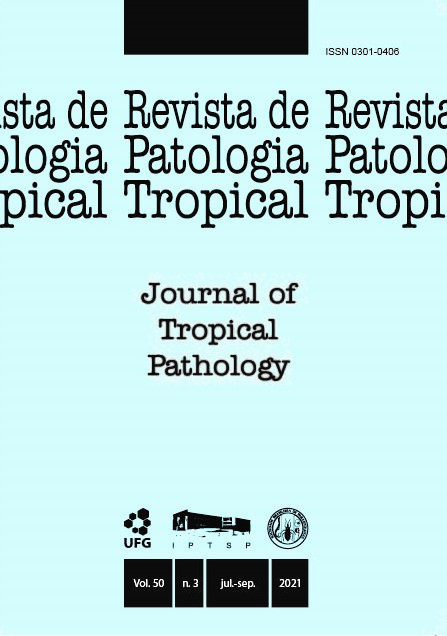Relation between CANDIDA species isolated from vaginal mucosa and lesions caused by high-risk human papillomavirus hpv for cervical cancer
DOI:
https://doi.org/10.5216/rpt.v50i3.66032Resumo
This study characterized and related yeasts of the genus Candida isolated from vaginal mucous membranes of women with lesions caused by high-risk HPV for cervical cancer. Forty-two women treated at the Lower Genital Tract Pathology Clinic of the University of São Paulo Medical School Hospital of Clinics were examined, with 30 high-grade (G1) uterine lesions with a mean age of 36.5 years ± 11. 1 and 12 with low grade (G2) uterine lesions with a mean age of 34.7 years ± 15.5. Clinical conditions and laboratory data on HPV were collected from patients’ medical records; the socio-demographic data obtained from an appropriate questionnaire. For the study of association between the variables, Odds Ratio analysis was used from the STATA 13.1 program. Patients G1 had a higher prevalence for diabetes and the results indicated 27% prevalence of Candida spp. in vaginal mucosa, in G2 this was 33% in vaginal mucosa. Among the species found in vaginal mucosa of patients, Candida albicans was the most isolated with 88%, followed by C. tropicalis (8%) and C. glabrata (4%). The strains of C. albicans isolated from mucosa presented sensitivity to all antifungal agents tested, unlike the C. tropicalis strain isolated in G2 in vaginal mucosa, which presented a resistance profile to fluconazole. Thus, monitoring and supervision through clinical and laboratory testing of HPV patients is important, reinforcing the need for care, treatment and prevention of HPV-related infections and Candida spp.
KEY WORDS: vaginal mucosa; uterine cervical neoplasms; human Papillomavirus; Candida spp. Antifungal sensitivity.
Downloads
Downloads
Publicado
Como Citar
Edição
Seção
Licença
The manuscript submission must be accompanied by a letter signed by all authors stating their full name and email address, confirming that the manuscript or part of it has not been published or is under consideration for publication elsewhere, and agreeing to transfer copyright in all media and formats for Journal of Tropical Pathology.

